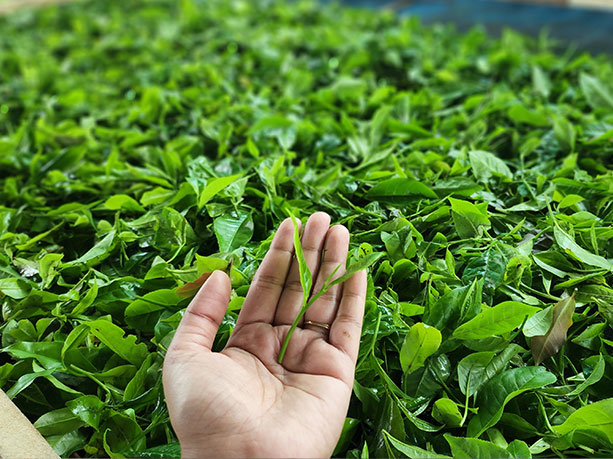Karuna Daimari shows us how to turn adversities into opportunities through sheer determination and hard work.
The role of most women in the tea industry often ends with plucking leaves. But not for Karuna Daimari — who is trying to change the stereotyped narrative by embracing entrepreneurship.
Karuna Daimari, a small tea farmer from the Udalgiri district in Assam, was suddenly put to the throes of a harsh reality when her husband got killed by a wild mithun (a large domestic cattle) at work in the farm.
“I was pregnant when he died. In the initial days, I used to think of getting rid of the tea garden but could not gather myself to abandon something that he had worked upon so hard,” she says, reminiscing the hard times. For the first two years since the tragedy, Karuna had left the business at the hands of the sardar (the farm caretaker) as she was unfamiliar with the workings of the industry. It was in 2005 when she decided to take the reins of the farm in her hands and shoulder the responsibilities of her family. Since then, she has extended the farm area from 42 to 50 bighas.
“It has been a life of intense hardship, and often people ask me how I have done it,” says Karuna, who is an inspiration for many in her village.
Karuna bikes her way to the garden every day, which is about 6 km away. She even has to cross one river on the way — which is the only way to reach her garden!
“I learnt to ride the two-wheeler so that I can visit my garden every day,” Karuna smiles away as she mentions this.
At 38, Karuna has turned herself into a model woman farmer. She not only supports 30 women and about 12 men workers by providing them employment in her farm, but is also a devout adherent of sustainable farming practices.
“All thanks to TRINITEA (an initiative of Solidaridad and Indian Tea Association) for introducing me to the sustainable ways of growing my tea. I have gained immensely from the trainings and field demonstrations,” Karuna mentions. In 2020, Karuna recorded a total crop production of 92,410 kg, higher up from 39,150 kg in 2007.
One of the major hurdles Karuna faced at the very start of her enterprising (farming) journey was her lack of knowledge about tea cultivation. It was her determination to overcome the challenges and the subsequent association with the ABSTGA that helped her sail through. With the help of the association, Karuna got herself enrolled into the TRINITEA programme that guided her into the intricacies of good tea farming practices. The scientists and trainers handheld her through the entire process, from creating awareness about the social, economic and environmental aspects of sustainable farming to facilitating market and supply chain access for her.
Karuna never fails to attend the TRINITEA meetings with experts. The regular trainings on different scientific methods of cultivating tea have after all helped her cut down the input costs. In fact, despite the perpetual low green leaf price, Karuna has managed to make profit just by reducing the input cost for her garden.
“I’m still learning a lot from TRINITEA. The programme is helping me become a smart farmer through the digital adoption of farming techniques,” she admits, beaming with confidence.
Karuna now aspires of sharing her knowledge about environmental sustainability and good agricultural practices with the rest of the people in her village. She has created separate chemical storehouses in her farm. She has also displayed posters on environmental awareness in the garden for the farm workers to learn about the positive impact of sustainable farming on the environment.
She has bigger plans: “I want to set up my own factory so that I don’t have to depend on others for a decent price.”
Karuna’s is a story of hard work and determination that every woman in India can draw inspiration from. From a novice to a rural entrepreneur in agriculture, she has been breaking the stereotypes every day since last 16 years, raising her two sons and her farmland single-handedly with equanimity — and with her unflinching quest for a better life.

